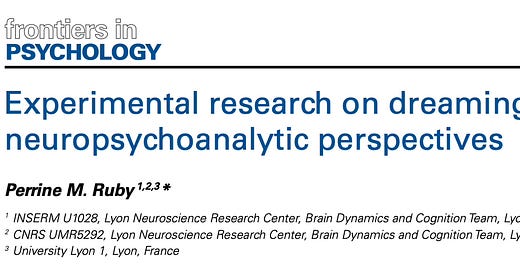‘Oneirology’ is the scientific approach to understanding dreams in relation to the functions of the brain.
Is the organization of the dream’s representations chaotic or is it determined by rules?
What is/are the function(s) of dreaming?
Deep into that darkness peering, long I stood there, wondering, fearing, doubting, dreaming dreams no mortal ever dared to dream before.—Edgar Allan Poe
Again, dreams are a mystery. One study suggests that we dream less and less as we age. The explained variance, however, was small.
What follows is my present personal experience.
I am 70+ years old. Starting in April of this year (four months ago—it may be six months now), I began waking up at the conclusion of movie-like vivid dreams. I began recording the content of these dreams. In 80% of these dreams, my conduct is rather heroic. While (for example within the dream after which I awoke at 3 am this morning) invariably I am the victim of some injustice, upon reflection, I invariably realize I’ve conducted myself in an manner I consider admirable.
In the remaining 20%, however, my behavior has been shameful.
Almost all my dreams occur in research institutes. The late-great Colorado State University professor (my PhD mentor), Edward A. Hoover, DVM, PhD, appears in the majority of my dreams.
What a mystery❗️
Of the questions posited above, the question I will focus on herein is What is/are the function(s) of dreaming?
The exact function of dreaming is still debated, but current research suggests it plays a crucial role in memory consolidation, emotional processing, and even threat simulation.—Google’s AI Overview.
One study* showed that problems occurred very frequently in the manifest dream content and that these problems were nearly systematically related to the problems noted during pre-sleep wakefulness. In addition, they observed that effective dreams (i.e., dreams that presented some solution to the individuals’ problems) were followed by a waking state in which the impact of the problems was diminished, whereas ineffective dreams were followed by the persistence of the problems.
Of course, the critical question with which I leave you is What is the difference between and effective dream and an ineffective dream❓
This morning (and following the 80% of dreams wherein I exhibit heroic behavior) I feel like the impact of [my] problems have been diminished.
I pray that this is the case.
*Greenberg, R., Katz, H., Schwartz, W., and Pearlman, C. (1992). A research- based reconsideration of the psycho- analytic theory of dreaming. J. Am. Psychoanal. Assoc. 40, 531–550.





